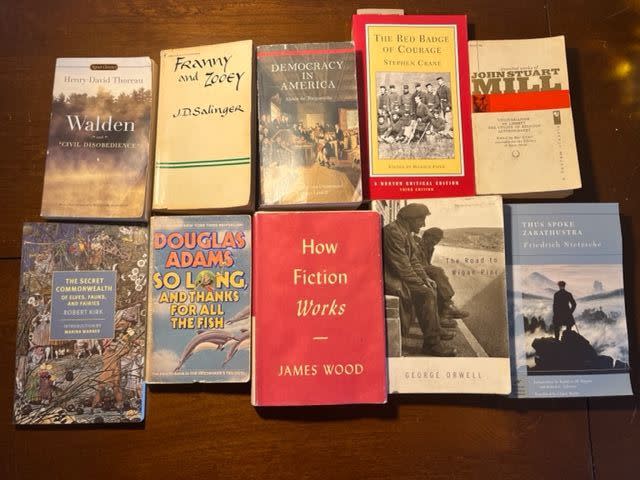I used to pick books based on how applicable they were to my life: sales books when I worked in sales, Buddhism books during my quarter-life crisis, writing books when I became a freelancer, and so on.
But then the pandemic hit. Isolated from pretty much everything, “applicable” didn’t feel as important anymore. I felt the urge to study all those subjects that, as an econ major with a penchant for parties, I never got around to in college.
Get the Zapier blog in your inbox
I started making book lists. The classics of philosophy, history, politics, and literature were well represented. But so were some random books, like a few on evolutionary psychology or gorillas. Excited at the idea of becoming the next Noam Chomsky, I ordered 10 books and planned to dedicate evenings to my studies.
But I was quickly defeated, both by some of the more challenging books and by my lack of self-motivation. Until I stumbled upon a solution: a weekly call with a friend.
Why reading broadly can help your career
Reading widely is personally gratifying and can make you a more well-rounded person, but it can also help with your career. Here’s why.
It helps you connect with people
My grandmother was constantly reading, and when she wasn’t, she was talking—engaging in political debates, telling funny stories, or explaining the history of some region or institution. She could connect with almost anyone because she was well-read on such a wide range of topics. That kind of connection is important in the career world too.
Even if you’re only slightly familiar with a topic, you can ask some great questions that move a conversation forward. For example: during a hike, I was having a conversation with a friend of a friend about his work in private equity. I’d read three finance books early in my career, and even though I was a financial amateur compared to him, my brief explorations into the field gave me enough context to ask some questions. And I must’ve come across as at least somewhat competent because a few months later, he asked me if I could write some blog content for his friend’s startup. Business lead generated!
It helps you identify interests
In Range: Why Generalists Triumph in a Specialized World, David Epstein talks about how many top performers went through a sampling period in their careers. This is when they experimented with many different jobs, industries, sports, or crafts, picking up skills from each, before finally settling on the one that best fit their talents and interests.
When you read, you’re often sampling other careers indirectly, and learning about your interests. If I hadn’t read Jack London’s Martin Eden, a novel about a self-taught writer, and Anne Lamont’s Bird by Bird, it may never have occurred to me to transition out of sales and into writing.
Of course, books won’t change everyone’s career path, but they might at least help you better understand what aspects of your job are fulfilling and how to see your work in a new light.
It makes you more creative
Reading across disciplines gives you material for creative association, when concepts from your memory crash into each other and create new ideas and solutions that are entirely your own. Your mind becomes more unique—and that’s valuable.
A marketing manager tasked with rolling out a new technology and who’s read a bit of psychology will likely be more successful at influencing product adoption than a marketing manager who only reads marketing books.
The application problem

Knowing the benefits is one thing, but it’s still hard to turn the practice into a habit. In 2020, I was entirely convinced of the value of reading across disciplines and studying hard, deep books. Even with my knowledge lust, I still managed to rack up unfinished books, especially when encountering long books, or when trying to self-study philosophy.
Notes of a Native Son? Failed. The Republic? Failed, quite miserably actually. Nicomachean Ethics? Oops, I did it again! And this is even though I was truly enjoying these books. It was just a matter of demotivation. And that demotivation, I now know, was caused by something I like to call the problem of application.
The rule is simple: the less applicable a book seems to our lives, the more likely we are to feel demotivated and quit.
We crave some tangible payoff for our labors, and so we feel an aversion to spending our time and energy reading challenging books that won’t have a direct and noticeable impact on our careers, businesses, or lives. So it’s easy for the average copywriter to plow through five books on copywriting but nearly impossible for them to get through a classic work of American literature.
Even if we sense that the reading experience will help us grow intellectually and emotionally, or even help us find the right career, those payoffs are often hard to see and might not come until much later, making it hard to connect the book to a success. It’s kind of like the first couple of times you try meditating (“This isn’t working…”).
To solve this problem of application, you have to create an environment where you can apply your learnings. Most of us don’t have teachers assigning us essays or tests to apply the knowledge we picked up from our reading. We have to manufacture them, and that’s exactly what I did—albeit accidentally.
Why a weekly Zoom call with a friend motivates me to read
About six months into the pandemic, I began having weekly Zoom calls with a childhood friend. These became our Friday night outings. Our conversations usually began with life updates, funny stories, and prods at each other to grab another drink. But, sooner or later, it always turned to books, ideas, or politics.
These calls became a place where I could apply what I had learned in my reading. I got to share my literary analysis of Jack London’s Martin Eden. I got to use what I’d learned in The Federalist Papers to comment on current events. I got to relay experiments and anecdotes from psychology books.
On those calls, the effects of reading widely went from nearly invisible to entirely obvious, and after every call, I felt a jolt of motivation to tackle my next book.
Here’s how you can do the same.
-
Choose someone whose expertise is different from yours. It helped that my friend was knowledgeable in many areas I wasn’t. For starters, it opened me up to new perspectives and ideas. Plus, whenever I had nothing to say or had no idea what he was talking about, I felt inadequate, and this tapped into my competitive side for even more motivational fuel.
-
Relate your reading to current events. The best way to make something feel applicable is to think about it in the context of what’s happening in the world.
-
Don’t shy away from “book club” format. Sometimes my friend and I choose books to read together. At the moment, we’re reading Albion’s Seed, a cultural history of the U.S. While it’s not strictly necessary, it’s a nice way to dive deep into a specific topic, and it helps you focus as you’re reading since you know you’ll be discussing it.
-
Have a couple drinks. This is what helps me feel confident attempting to retrieve concepts that might’ve otherwise seemed too challenging to remember and articulate. Of course, you could also just use real confidence, if you have it.
Read widely, and then apply what you learned
It’s easy to stay in your lane, only reading books that you know you’ll be able to apply to your work the next day. But that confines you and closes you off to perspectives and knowledge that could be incredibly valuable in your professional life.
Of course, I’ve also gained something else from these calls, something much more valuable than intellectual cultivation. I’ve gained a stronger relationship with one of my oldest and dearest friends.
[adsanity_group align=’alignnone’ num_ads=1 num_columns=1 group_ids=’15192′]
Need Any Technology Assistance? Call Pursho @ 0731-6725516







